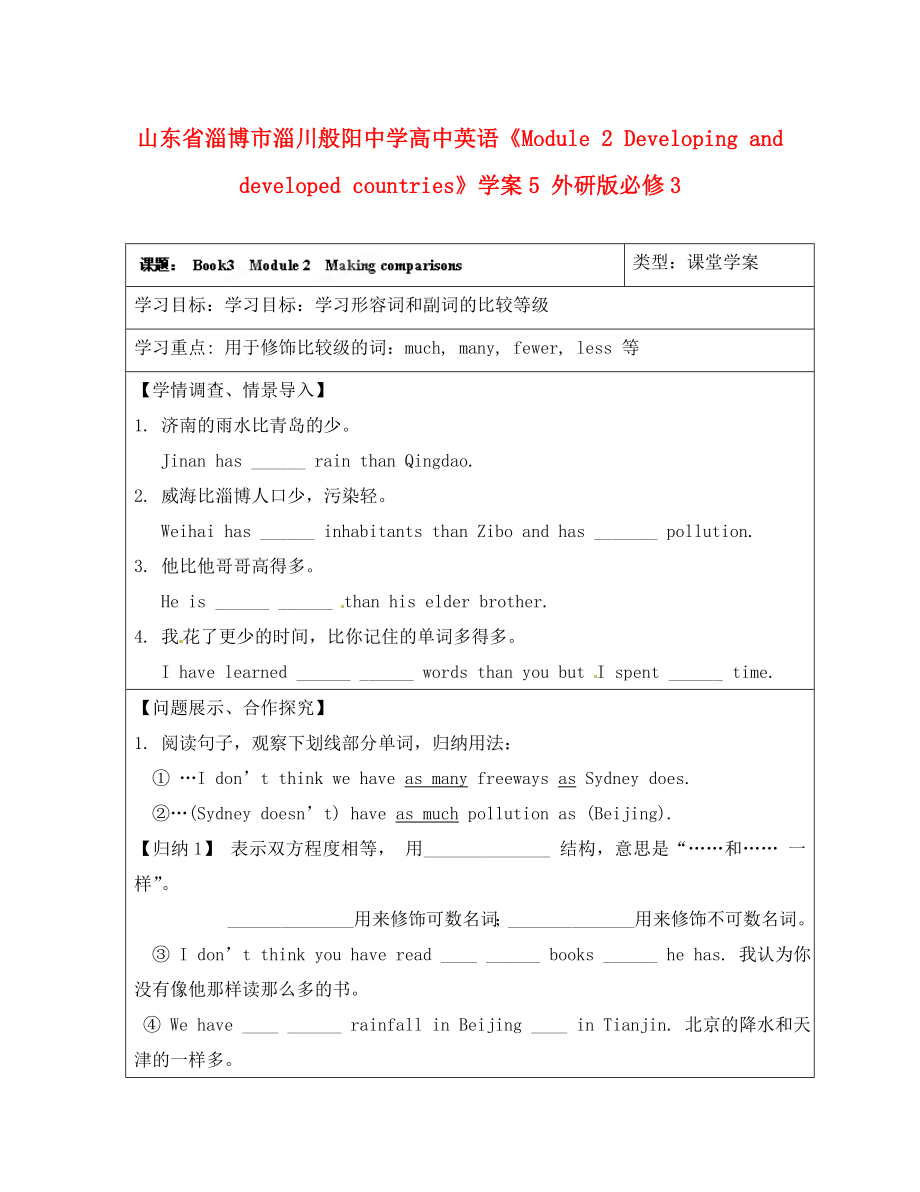《山東省淄博市淄川般陽中學(xué)高中英語《Module 2 Developing and developed countries》學(xué)案5 外研版必修3》由會(huì)員分享��,可在線閱讀���,更多相關(guān)《山東省淄博市淄川般陽中學(xué)高中英語《Module 2 Developing and developed countries》學(xué)案5 外研版必修3(3頁珍藏版)》請(qǐng)?jiān)谘b配圖網(wǎng)上搜索。
1���、山東省淄博市淄川般陽中學(xué)高中英語《Module 2 Developing and developed countries》學(xué)案5 外研版必修3
類型:課堂學(xué)案
學(xué)習(xí)目標(biāo):學(xué)習(xí)目標(biāo):學(xué)習(xí)形容詞和副詞的比較等級(jí)
學(xué)習(xí)重點(diǎn): 用于修飾比較級(jí)的詞:much, many, fewer, less 等
【學(xué)情調(diào)查��、情景導(dǎo)入】
1. 濟(jì)南的雨水比青島的少�����。
Jinan has ______ rain than Qingdao.
2. 威海比淄博人口少�,污染輕。
Weihai has ______ inhabitants than Zibo and has _______ pollut
2�、ion.
3. 他比他哥哥高得多。
He is ______ ______ than his elder brother.
4. 我花了更少的時(shí)間�����,比你記住的單詞多得多��。
I have learned ______ ______ words than you but I spent ______ time.
【問題展示�����、合作探究】
1. 閱讀句子���,觀察下劃線部分單詞����,歸納用法:
① …I don’t think we have as many freeways as Sydney does.
②…(Sydney doesn’t) have as much pollution a
3�����、s (Beijing).
【歸納1】 表示雙方程度相等, 用______________ 結(jié)構(gòu)�,意思是“……和…… 一樣”。
______________ 用來修飾可數(shù)名詞����;______________ 用來修飾不可數(shù)名詞。
③ I don’t think you have read ____ ______ books ______ he has. 我認(rèn)為你沒有像他那樣讀那么多的書���。
④ We have ____ ______ rainfall in Beijing ____ in Tianjin. 北京的降水和天津的一樣多。
2. 閱讀句子��,觀察下劃線部分單詞��,歸納用法:
① …
4��、there are fewer tourists in Beijing (than in Sydney).
②…I think Sydney has less rain (than Beijing).
③He has done much more work than expected.
④ Beijing has many more inhabitants ( than Sydney ).
【歸納2】在比較級(jí)中
fewer … than 用來修飾________ 名詞����,表示“ 少于…… ”;
less … than 用來修飾 ________ 名詞����,表示“ 少于…… ”����;
man
5���、y more … than 與________ 名詞連用���, 表示“ 比……多得多 ”;
much more … than與________ 名詞連用�����, 表示“ 比……多得多 ”�����。
⑤ There are ______ tourists in Beijing ( ______ in Sydney ). 北京的游客比悉尼的游客少���。
⑥ I think Sydney has ______rain (______ Beijing ). 我認(rèn)為悉尼的雨水比北京少��。
⑦ He has made ______ ______ progress in English this term _______
6���、 last term.
這學(xué)期他在英語方面取得的進(jìn)步比上學(xué)期大得多。
⑧ He?has?_______ __________?friends?than?I.?他的朋友比我的朋友多得多�。
3. 閱讀句子�����,觀察下劃線部分單詞����,歸納用法:
① … Beijing has a lot more inhabitants (than Sydney)and is much more crowded.
② …(Beijing)is less dangerous (than Sydney).
【歸納3】在比較級(jí)中l(wèi)ess + adj. + than 表示程度上 “不如……” ����;
more + ad
7、j. + than 表示程度上 “比……更加……”
③ Beijing is______ dangerous ( than in Sydney ). 北京不如悉尼危險(xiǎn)����。
④ Which?is?the?_________?country,?Japan?or?Australia?
A.?more?developed???B.?more?developing???C.?most?developed???D.?most?developing
4. 修飾比較級(jí)的詞還有:a bit, a little, rather, far, by far, a lot, lots, a great deal,
8、 any, still, even等
① ---- Are you feeling ____? ---- Yes��,I'm fine now.
A. any well B. any better C. quite good D. quite better
② It was hot yesterday. But it is _______ hotter today.
A. more B. much more C. even D. more much
5. 比較級(jí)用于否定結(jié)構(gòu)可表示 “ 最……不過 ”�。
① I couldn’t agree with you
9��、more. 【譯】_________________________
② It couldn’t be worse. 【譯】_________________________
【當(dāng)堂檢測(cè)��、鞏固提升】 Choose the correct word:
【四���、知識(shí)梳理�、歸納總結(jié)】
修飾比較級(jí)的詞及其用法:
【五、預(yù)習(xí)指導(dǎo)�����、新課鏈接】
預(yù)習(xí)目標(biāo):Module 3 The Violence of nature
1. New words of Module 3 2. Reading passages about the violence of nature
Knowledge makes humble, ignorance makes proud.?? 知識(shí)使人謙虛����,無知使人驕傲。
 山東省淄博市淄川般陽中學(xué)高中英語《Module 2 Developing and developed countries》學(xué)案5 外研版必修3
山東省淄博市淄川般陽中學(xué)高中英語《Module 2 Developing and developed countries》學(xué)案5 外研版必修3

